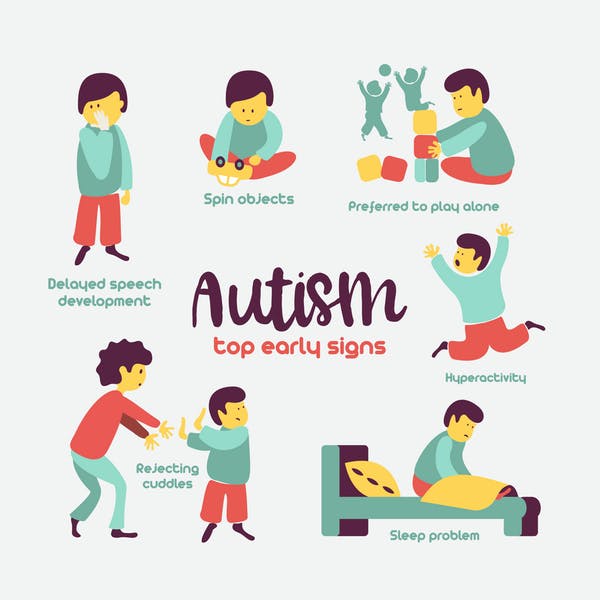Puberty is stressful and confusing for typical kids; the experience is compounded for adolescents with autism or other conditions. Confronting additional challenges like mood swings and hormonal change on top of developmental and communication issues means middle school can be a rocky time for the entire family.
Supporting a healthy transition to adulthood requires extra awareness during the often-complicated physical and behavioral changes puberty brings.
 Tell-tale physical signals
Tell-tale physical signals
Kelli Moran’s son Daniel, now 17, was in the 5th grade when she first noticed his physical changes. He became “more agitated,” so the Hatboro, PA mom took concrete steps to help: She increased Daniel’s exercise, asked his doctor to adjust medication, and used his medical insurance to hire a behavior specialist consultant (BSC) for home sessions to help him adapt.
Daniel’s BSC used social stories with pictures to give him step-by-step instructions for shampooing his own hair and other grooming techniques that he now accomplishes on his own. “It’s hard to believe, he has been shaving by himself with disposable razors for three years,” Kelli reports.
Caroline Eggerding, MD, division head for pediatric neurology and development at Cooper Regional Children’s Hospital in Camden, NJ, notes that the huge hormonal shifts, body changes and self-image will all affect behavior.
“Adolescents engage in risk-taking behavior, are irritable and display more aggressive behavior — everything is exaggerated.” For parents, there are many questions to consider. What about dating, the school prom, and dealing with hormonal surges in both boys and girls?
Puberty’s behavioral challenges
“Socially, we have different expectations for a teen than for an 11-year-old. These things play out whether or not the child is on the autism spectrum,” Eggerding explains. The degree of functioning — mild or high — can also play a role in a smooth or choppy transition. “Kids at this age may be more sensitive to the fact that they are different, and working to enhance the ability to engage in adolescent banter may help them.”
Another source of conflict, Eggerding notes, is parental concern over the tween or teen’s desire for independence. “It’s hard to let go, especially if you are concerned about isolation. Their desire to be more independent is hard for everybody.”
Before Val Murphy’s daughter Erin started menstruating, Val noticed major mood changes — including bouts of crying. Erin was diagnosed with autism at age 3, and she’s non-verbal, so her mother didn’t know exactly what was going on.
Val can’t always tell whether her daughter understands what she’s been told, so treating Erin “like a typical young woman” became a major problem, especially with information about menstruation. “I showed her how to use a pad, and it took a long time for her to understand, but she finally got it,” says Val. “Puberty is like anything else in her life; it takes a long time for the process, but in the end she does get it.”
Discussions surrounding puberty and sexuality can be difficult for parents who want to say and do the right thing. Adding autism or another developmental delay makes it more complicated when it comes to heart-to-heart talks.
Preparing for difficult “talks”
Stephanie Chopko, a clinical pediatric psychologist at the Nemours Alfred I. Dupont Hospital for Children in Wilmington, DE, says determining an exact approach for a child with autism is difficult because parents will have to gear what they say to their child’s level of understanding.
“It is important to make sure the parent is comfortable with the topic before talking with pre-teens or teens,” she says. “Start earlier than you would think, because children are exposed to these subjects early from their classroom peers. If their typical level of understanding is five years below their age, a parent should gear talks to an 8-year-old instead of a 13-year-old.”
Chopko’s advice: “I tell parents to have one or more practice conversations with another adult. This is not a one-time conversation but an ongoing process. Let your child know you are available and open to questions, and can continue later. All of this can be scary, especially for children with autism who are used to routine and find themselves undergoing change.”
Next steps: puberty & sexuality
Laura Holmes, a researcher at the Emily Center for Autism Research at Children’s Hospital of Philadelphia (CHOP), says that her center holds a workshop, “Next Step for Adolescence,” for parents unsure of how to proceed.
“Consult your education team or health care professional when it comes to the topic of sexuality,” says Holmes. Other workshop topics include appropriate touch and romantic feelings. It’s important for parents to feel ready for these conversations. Reading up about sexuality and healthy relationships can help.
It also helps to ask around. “Talk to other parents and health professionals. Your panic will go away and you’ll have a good idea of what you want to say, even if you can’t predict exactly how the conversation will go.”
Holmes adds another important message parents can convey to any pre-teen or teen: “Anytime you have a question, come to me; this is something we can talk about.”
Debra Wallace is a freelance writer.
Puberty resources for tweens and teens with special needsOnline
Books
|






